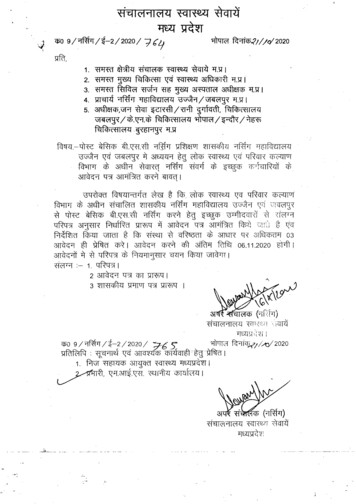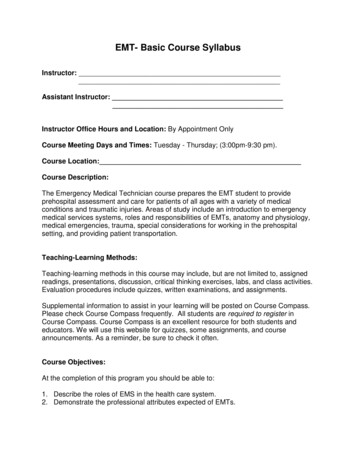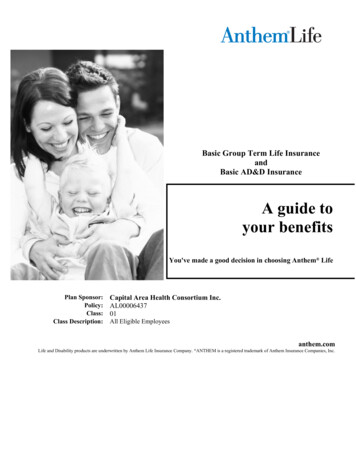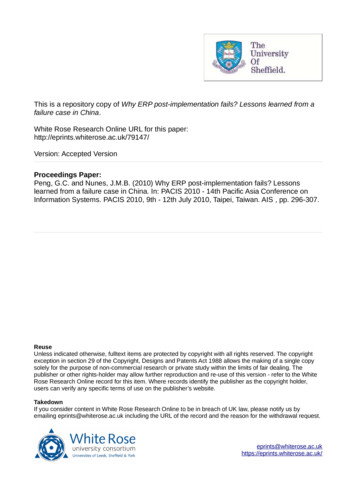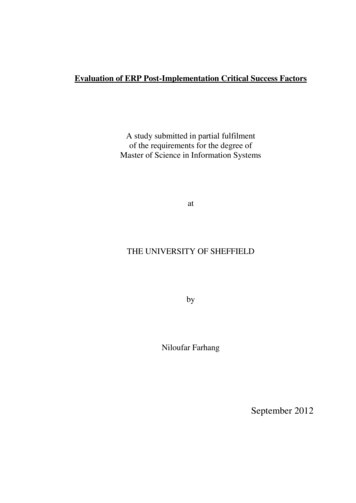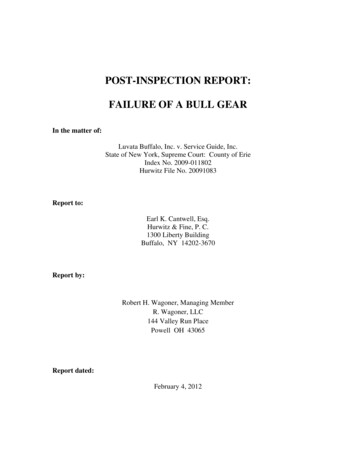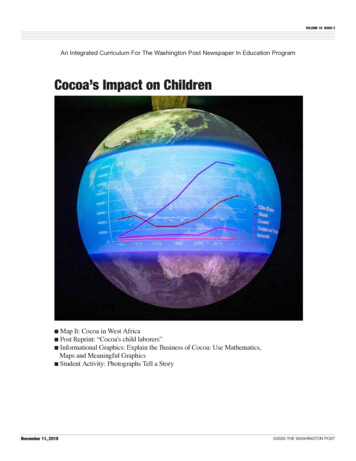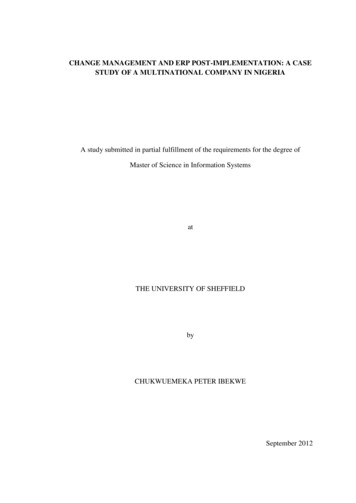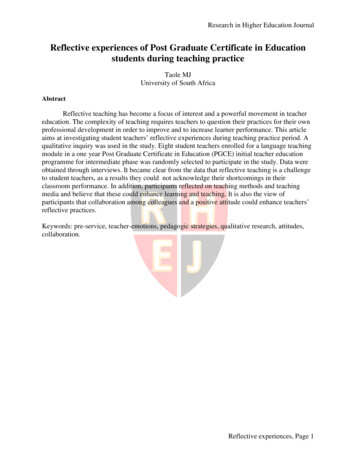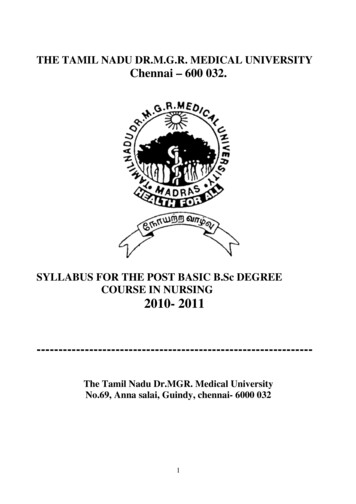
Transcription
THE TAMIL NADU DR.M.G.R. MEDICAL UNIVERSITYChennai – 600 032.SYLLABUS FOR THE POST BASIC B.Sc DEGREECOURSE IN NURSING2010- ----------------The Tamil Nadu Dr.MGR. Medical UniversityNo.69, Anna salai, Guindy, chennai- 6000 0321
THE TAMILNADU DR.M.G.R. MEDICAL UNIVERSITYCHENNAI – 600 032.REGULATION AND SYLLABUS FORPOST BASIC B.Sc DEGREE COURSE IN NURSING2010 – 2011The University emblem symbolizes various systems of medicine adPara medical systems. It also depicts the global character ofpreventive, promotive, and curative medicine. The motto “HEALTHFOR ALL” reflects all the objectives of this medical ------------------------------------------The Tamil Nadu Dr.MGR. Medical UniversityNo.69, Anna salai, Guindy, chennai- 6000 0322
THE TAMILNADU DR.M.G.R. MEDICAL UNIVERSITYCHENNAIREGULATIONS OF POST BASIC B.Sc. NURSINGIn exercise of the powers conferred by section 44 of the Tamilnadu Dr.MGRMedical university, Madras Act, 1987 (Tamilnadu Act, 37 of 1987), the standingAcademic Board of the Tamilnadu Dr.MGR Medical University, hereby makes thefollowing regulations:SHORT TITLE AND COMMENCEMENTThese regulations shall be called “THE REGULATIONS FOR THE POSTBASIC B.Sc., DEGREE COURSE IN NURSING, THE TAMILNADU DR.MGRMEDICAL UNIVERSITY, CHENNAI”They shall come into force from the academic year 2010-2011 onwards.The regulations framed are subject to modifications from time to time by thestanding Academic Board.2. ELIGIBILITY FOR ADMISSIONCandidates belonging to all categories for admission to the course of Post BasicB.Sc. Nursing(a) Should have qualified in Diploma in Nursing and be a registered Nurse andMidwife in the Tamil Nadu Nursing Council or any other State Nursing Councilalso register in the Tamil Nadu Nursing Council accepted by the authority of thisUniversity.(b) After GNM with the Registration certificate from the State Nursing Council, thecandidate can be permitted to join in Post Basic B.Sc. Nursing without workexperience.(c) If the registration certificate cannot be obtained immediately, the original evidencefor registration in the form of receipt or any other authenticated document from theoffice of the State Nursing Council will be acceptable in lieu of the RegistrationCertificate.(d) . A male nurse, trained before the implementation of the new integrated coursebesides being registered as a nurse with State Nurses Registration Council, shall3
produce evidence of training approved by Indian Nursing Council for a similarduration in lieu of in any one of the following areas: O.T. TechniquesOphthalmic NursingLeprosy NursingTB NursingPsychiatric NursingNeurological and Neuro Surgical NursingCommunity Health NursingCancer NursingOrthopaedic NursingOccupational Nursing(e) To be eligible for admission to this course, a candidate shall have:(i)Passed the Higher Secondary or Senior Secondary or Intermediate or10 2 or an equivalent examination recognized by the University forthis purpose. Those who have done 10 1 in or before 1986, will beeligible for admission.(ii)Obtained a certificate in General Nursing and Midwifery andregistered as R.N.R.M. with the State Nurses Registration Council.(iii) Every candidate before admission to the course shall submitto the Principal of the institution a certificate of medicalfitness from an authorized medical officer that the candidateis physically fit to undergo the academic course.2. UPPER AGE LIMITThere shall be no upper age limit for admission to the first year of post basic B.Sc.Degree Course in Nursing.3. ELIGIBILITY CERTIFICATE:Candidates before seeking admission to any one of the affiliated Nursing collegesshall obtain an Eligibility Certificate from the University by remitting the prescribed feesalong with the application form.4. REGISTRATION:A Candidate admitted in the Post Basic B.Sc. Degree Course in Nursing in any oneof the affiliated institutions of this University shall register his / her name with thisuniversity by submitting the prescribed application form for registration duly filled, alongwith the prescribed fee and a declaration in the format to the Academic Officer of thisUniversity through the affiliated institution within 60 days from the cut-off date prescribedfor the course for admission. The applications should have date of admission of the course.5. DURATION OF THE COURSE4
The duration of certified study for the Post Basic B.Sc. Degree course in Nursingshall extend over a period of two academic years.6. COMMENCEMENT OF THE COURSE/ACADEMIC TERMSThe course will commence from 1st August of the year7. COMMENCEMENT OF EXAMINATIONS1st August/1st FebruaryIf the date of commencement falls on Saturdays, Sundays or declared Publicholidays, his examination shall begin on the next working day.8. CUT-OFF DATES FOR ADMISSION TO EXAMINATIONSa) Candidates admitted from 1st June to 30th September of the academic year will beregistered to take up their first year examinations, after fulfillment of the regulations from15th August of the ensuing yearb) Candidates admitted from 1st October to 31st December of the academic year willbe registered to take up their first year examinations, after fulfillment of the regulationsfrom 15th November of the ensuing year9. MEDIUM OF INSTRUCTIONSEnglish shall be the Medium of Instruction for all the Subjects of study and forexaminations of the Post Basic B.Sc. Nursing.10. CURRICULUM:The Curriculum and the syllabi for the course shall be as prescribed from time totime by the Standing Academic Board of this University.11. WORKING DAYS DURING A YEAREach year shall consist of not less than 270 working days.12. ATTENDANCE REQUIRED FOR ADMISSION TO EXAMINATIONS(a) No candidate shall be permitted to appear in any one of the part of Post BasicB.Sc. Nursing Degree Course Examinations unless he/she has attended the course in thesubject for the prescribed period in an affiliated institution recognized by this Universityand has produced the necessary certificate of study, attendance and progress from the headof the institution.5
(b) A candidate is required to put in minimum of 90% of attendance in both theoryand practical separately in each subject before admission to the examinations.(c) A candidate lacking in the prescribed attendance and progress in any one subjectin theory and practical in the first appearance shall not be permitted admission to the entireexaminations.13. CONDONATION FOR LACK OF ATTENDANCEThere shall be no condonation for lack of attendance.14. INTERNAL ASSESSMENT MARKSThe Internal Assessment should consist of the following points for evaluation:i)Theoryii)Practical/Oraliii)Viva(a)A minimum of three written examinations shall be conducted in each Subjectduring a year and the average marks of the three performances shall be takeninto consideration for the award of sessional marks.(b) A minimum of two practical examinations shall be conducted in each subject(wherever practical have been included in the curriculum) and grades ofongoing clinical evaluation to be considered for the award of sessional marks.(c) A failed candidate in any subject should be provided an opportunity to improvehis sessional marks by conducting a minimum of two examinations in theoryand practical separately.(d) If a failed candidate does not appear for any “Improvement Mark Examinations”in the failed subject (s) the internal marks awarded for the previous examinationshall be carried over for his subsequent appearance(s).The uniform dates for submission of Internal Assessment Marks are as follows:For the subjects of one year durationAt the end of January, April & June and the aggregate of final internal assessmentmarks on or before 10th July.The aggregate of Final Internal Assessment Marks submitted on or before 10thJuly/10th January as per scheme of examinations shall be taken by the University asInternal Assessment Marks and a minimum of 50% of marks is mandatory for permittingthe candidates to University Examinations.15. SUBMISSION OF RECORD NOTE BOOKS6
At the time of practical examination, each candidate shall submit to the examinersthe record note books duly certified by the Head of the Department as a bonafide record ofwork done by the candidate.15. CARRY- OVER OF FAILED SUBJECTS(a) Candidates are permitted to carry over the failed subjects to the next year.(b) A candidate who has failed in more than three subjects shall not be permitted toundergo study and training of the next year.(b)(c)The failed candidates can appear for the ensuing February/Augustexaminations.Only three attempts are allowed in each subjects including first attempt.16. MARKS QUALIFYING FOR A PASSA candidate shall be declared to have passed the examinations, if he/she obtains thefollowing qualifying marks:(a) 50% of marks in the subjects where internal evaluation alone is conducted(b) 50% of marks in the University theory examinations;(c) 50% of marks in University practical examination.(d) 50% aggregate in theory, practical and internal evaluation marks taken together.(e) 40% of marks shall be for English only.17. READMISSION AFTER BREAK OF STUDYAs per the Book of the Regulations published by the University for Readmission.18. MIGRATION/TRANSFER OF CANDIDATESAs per the Regulations prescribed by the University19. VACATIONThe Head of the institution shall declare two weeks vacation in an academic year tothe students. The period(s) of vacation can be decided by the Head of the Institution.COURSES OF STUDYFirst yearSl.No.SubjectHours Theory1.Nursing Foundation607HoursPractical--In Hours
2.Nutrition & Dietetics50203.Biochemistry 60--45.6.7.8.9.10Maternal NursingChild HealthNursingMicrobiologyMedical d logy90--11.Community HealthNursingMental Health100310100310100901002207016012In hoursNursing13.14.15.16Introduction toNursing EducationIntroduction toNursingAdministrationIntroduction toNursing Researchand StatisticsLibrary508
Total560109050Scheme of ExaminationsFirst yearPaperSubjectDuration1.Nutrition ion & Dietetics21535503.Biochemistry & logy3501001505.Maternal Nursing3501001506.Child Health Nursing3501001507.Medical & Surgical Marks100*Qualifying ExaminationPracticalsPaperSubjectDuration1.Medical & Surgical Nursing--INT.ASS.502.Maternal Nursing--50501003.Child Health--5050100EXT.ASS.100TotalMarks150Second Community Health Nursing35010015012.Mental Health Nursing35010015013.Introduction to Nursing Education3501001509
iontoNursingResearch & 0PracticalPaperSubjectDuration4.Community Health Nursing--INT.ASS.505.Mental Health Nursing--50501006.Research Project **--505050** Respective colleges will conduct the examination for this subject and the marks will be sentto the University.18.DURATION:Course DurationWeeks per yearVacationHours per weekHours per academic yearNo. of Working days per year2 years52 weeks2 weeks451700 hours270 daysANNEXURE-IDECLARARTIONI --------Son of / Daughter of ----------------------------------------Residing at ----------------and admitted to in Iyear of -----------(Name of the Course / U.G./P.G)at -------------(Name of the College) do hereby10
solemnly affirm and sincerely state as follows.I declare that I shall abide by the rules and regulations prescribed by the Tamil Nadu Dr.M.G.R Medical University, Chennai for the ----------------------------- (course) includingregulations for re-admission after the break of study.Date:signature of candidate/counter Signed/(Official date seal)Dean/Principal/ Director11
NURSING FOUNDATIONstPlacement: 1 YearTime allotted: Theory60hoursCOURSE DESCRIPTIONThis course will help students develop an understanding of thephilosophy, objectives and responsibilities of nursing as a profession. Thepurpose of the course is to orient to the current concepts involved in thepractice of nursing and developments in the nursing profession.OBJECTIVESAt the end of the course, the student will1.2.3.4.5.6.7.Identify professional aspects of nursingExplain theories of nursingIdentify ethical aspects of nursing professionUtilise steps of nursing process.Identify the role of the nurse in various levels of healthservicesAppreciate the significance of quality assurance in nursingExplain current trends in health and nursing.COURSE CONTENTSUNIT I-NURSING AS A PROFESSIONDevelopment of nursing as a professionIts philosophyObjectives and responsibilities of a graduate nurseTrends influencing nursing practiceExpanded role of the nurseDevelopment of nursing education in India and trends innursing education.Professional organizations, career planning12
NURSING FOUNDATIONstPlacement: 1 YearTime allotted: Theory60hoursCOURSE DESCRIPTIONThis course will help students develop an understanding of thephilosophy, objectives and responsibilities of nursing as a profession. Thepurpose of the course is to orient to the current concepts involved in thepractice of nursing and developments in the nursing profession.OBJECTIVESAt the end of the course, the student will1.2.3.4.5.6.7.Identify professional aspects of nursingExplain theories of nursingIdentify ethical aspects of nursing professionUtilise steps of nursing process.Identify the role of the nurse in various levels of healthservicesAppreciate the significance of quality assurance in nursingExplain current trends in health and nursing.COURSE CONTENTSUNIT I-NURSING AS A PROFESSIONDevelopment of nursing as a professionIts philosophyObjectives and responsibilities of a graduate nurseTrends influencing nursing practiceExpanded role of the nurseDevelopment of nursing education in India and trends innursing education.13
Professional organizations, career planningCode of ethics & professional conduct for nurses.14
UNIT II -CONCEPT OF HEALTH AND ILLNESS IN NURSINGEthical, legal and other issues in nursingConcepts of health and illness, effects on the personStress and adaptationHealth care concept and nursing care conceptDevelopmental concept needs roles and problems of thedevelopmental stages of individual- newborn, infant, toddler,pre adolescent, adolescent, adulthood, middle- age, old age.UNIT III – NURSING THEORIESTheory of nursing practiceMeta paradigm of nursing- characterized by four central conceptsi.e nurse, person (client/patient) health and environment.UNIT IV – NURSING PROCESS / PROBLEM SOLVINGAPPROACHNursing processAssessment Tools for assessment methods, recordingPlanning Techniques for planning care, types of care plansImplementation Different approaches to care, organizations Andimplementation of care, recordingEvaluation Tools for evaluation process of evaluationUNIT V – QUALITY ASSURANCEQuality assurance nursing standards nursing audit total qualitymanagement.Role of council and professional bodies in maintenance of standardsUNIT VI – CURRENT TRENDS IN HEALTH & NURSINGPrimary health care concept:community oriented nursingholistic nursingprimary nursing15
Family oriented nursing conceptproblem oriented nursingprogressive patient careteam nursingMETHODS OF TEACHING1.2.3.4.Lecture cum discussionRole PlayFiled tripsClinical practiceMETHODS OF EVALUATION1.2.3.4.5.6.Written assignmentsSeminarsOral PresentationsWritten and practical examsPoster presentationsClinical experience recordReference:1.2.3.4.5.6.7.Perry, A.G. & Potter, P.A.: Basic nursing essentials of practice; 5thed. St. Louis, Mosby, 2003Beverly Witler Dugas : Introduction to patient care in compressiveapproach to Nursing 4th ed., Saunders, 2002Luckmann, J & Sorensen, K.C.: Basic nursing: a psychophysiologicapproach ; 3rd ed., W. B. Saunders, 2002Kozier B, Erb, G & Oliver, R : Fundamentals of Nursing ;4th ed.California, Addison Wesley., 1991Park, J.E. :Text book of preventive and social medicine ; 17th ed.,Banarasidas Bhanot, 2003.A Community Health Nursing Manual prepared by “TrainedNurse’s Association of India.3rd EditionFundamental of Nursing prepared by “Trained Nurses Associationof Indian, 1st Edition.16
NUTRITION & DIETETICSstPlacement : 1 YearTime allotted : Theory -50HrsPractical -20hrsCOURSE DESCRIPTIONThis course is designed to provide the students with a wideknowledge of dietetics in Indian setting that the practice of teachingoptimum and realistic dietary planning can become an integral part ofnursing practice.OBJECTIVESAt the end of the course, the student will1.Explain the principles and practices of nutrition and dietetics2.Plan therapeutic diets in different settings3.Identify nutritional needs of different age groups and plandiet accordingly.4.Prepare meals using different methods utilizing cookery rules.COURSE CONTENTSUNIT I – INTRODUCTIONIntroduction to nutrition and dieteticsBalanced diet factors on which it dependsFactors to be considered in planningGuides available for planningFood Hygiene preparation and preservationReview of nutrients micro & macro.UNIT II - DIET THERAPYIntroduction to diet therapyRoutine hospital diets17
Therapeutic diet under each unit i.e Cardiovascular diseasesGastrointestinal diseases Renal disorders Endocrine and metabolicdisorders Allergy Infections and fevers Pre and post operative stage,Deficiency diseases and malnutrition overweight and underweightUNIT III – CHILD NUTRITIONInfant and child NutritionFeeding of normal infants Factors to be considered inplanning nutritional requirementsFeeding of premature infants factors to be considered inplanning nutritional requirementsSupplementary feeding of infants Advantage and methodof introductionWeaning effects on mother and childPsychology of infant and child feedingFeeding the sick child Diet in diseases of infancy andchildhood Deficiency states –malnutrition and under nutritionFeeding pre school child nutritional needs factors to be consideredin planning diets Problems in feedingSchool lunch Programme Advantages Need in IndiaUNIT IV – COMMUNITY NUTRITIONCommunity Nutrition Need for community nutrition programmeNutritional needs for special groups infant child adolescentpregnant woman lactating mother and old peopleSubstitutes for non vegetarian foods18
Selection of cheap and nutritious foods. Nutrition education needsand idualgroup/community.Current nutritional problems and national programesPRACTICUMI. Methods of cooking and cookery rules1.Simple preparation of beverages, soups, cereals and pulseseggs vegetables, meat.2.Menu Plans.II Preparation of supplementary food for infants.1.Food for toddlers2.Low cost nutritious dishes for vulnerable groups3.Dietary case study of patient on special diet and planningof low cost dietary instructions for home adaptations4.Planning of therapeutic diets.METHODS OF EVALUATION1. Written tests2. Assignement3. PracticalsMETHODS OF TEACHING1. Lecture cum discussion2. Cooking Demonstration3. Field visit19
Reference:1. Corinne H. Robinson Normal & Therapeutic Nutition MacmillanPublishing company — New York (1986) — 7th Edition.2. Srilakshimi Dietetics New Age international (P) Limited, Publishers,Bangalore (1995)— 1” Edition.3. Sue Rodweli Williams Clinical Dietetics & Nutrition Mosbv India yr;(200l) — 11th Edition,4. Antia Clinical Dietetics & Nutrition Oxford Publishing year ‘1989)— 3rd Edition5. Paul Insel R. Elaine Turner Don Ross Jones & Bailleti (2002)London — 1 Edition,6. Swaminathaji, N. M. Hand book of Food uu Nutrition, Publication,Bangalore, 198
Midwife in the Tamil Nadu Nursing Council or any other State Nursing Council also register in the Tamil Nadu Nursing Council accepted by the authority of this University. (b) After GNM with the Registration certificate from the State Nursing Council, the candidate can be permitted to join in Post Basi
